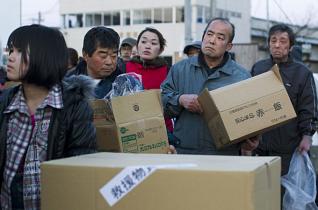Fukushima: Doctors and Nurses flee
Since the start of the crisis at Tokyo Electric Power Co.'s Fukushima No. 1 nuclear power plant, hundreds of doctors and nurses have resigned from nearby facilities, according to a survey by an association of Fukushima Prefecture hospitals.
Their departures have resulted in some hospitals in the prefecture suspending nighttime emergency care and other treatment services, the association said.
The survey found that 125 full-time doctors had resigned from 24 hospitals in the prefecture, or 12 percent of all doctors working at those institutions.
As for nurses, 407 had quit from 42 hospitals in the prefecture, representing 5 percent of the nursing staff at those institutions.
The survey was conducted in late July. There are 139 hospitals in the prefecture, and the survey covered all 127 that belong to the association, with 54 providing responses.
The survey found that the highest rate of doctors left from hospitals in Minami-Soma. Thirteen doctors resigned from four hospitals in the city, including one inside the no-entry zone. The figure represents 46 percent of the four institutions' total staff of doctors.
In Iwaki, 31 doctors at five hospitals, or 23 percent, resigned. In Fukushima, 41 doctors at six hospitals, or 9 percent, left their jobs. In Koriyama, 25 doctors at four hospitals quit, or 8 percent.
As for nurses, in Minami-Soma 44 left their jobs at four hospitals, or 16 percent of those institutions' total nursing staff. The figure includes two nurses who quit a hospital inside the no-entry zone.
In Iwaki, 113 nurses at seven hospitals, or 8 percent, resigned. In Fukushima, 68 at nine hospitals, or 4 percent, quit. In Koriyama, 54 at six hospitals, or 4 percent, resigned.
The association assumes most of the doctors and nurses who resigned did so due to their desire to leave the area amid concern about radiation exposure stemming from the nuclear disaster.
The actual number of doctors and nurses who have resigned could be much larger if the hospitals that did not respond to the survey and non-association member hospitals are included.
Minami-Soma is located within the areas that were previously designated as emergency evacuation preparation zones. The designation was lifted Friday, but the exodus of nearly 50 percent of the city's hospital doctors and 16 percent of hospital nurses could cause serious difficulties for local residents.
At Minami-Soma City General Hospital, the number of doctors has fallen from 14 to seven in the wake of the disaster, and 42 nurses have resigned (including some who quit after the survey).
The association said most of the departing doctors and nurses cited evacuation from the nuclear disaster as their reason. However, doctors who quit the hospital's obstetrics and gynecology department and pediatrics department said they were doing so because their patients had already left the city.
The city hospital has suspended services in its ophthalmology, otorhinology (ear and nose) and two other departments.
Hospital President Yukio Kanazawa said, "[The nuclear accident] destroyed the local community and our medical services.
"The end of the nuclear crisis is still not in sight, so I can't ask the doctors who've left to come back," he said.
At Yotsukura Byoin, a psychiatric hospital in Iwaki, about 35 kilometers from the Fukushima No. 1 nuclear power plant, three of the institution's six full-time doctors left the prefecture soon after the nuclear crisis began. Two of the three resigned at the end of March.
One of them said, "I'm concerned about radiation because I've got a small child."
The two doctors have since found new jobs in Nagano Prefecture, where their respective parents live.
In late August, the hospital asked one of the doctors via e-mail to return, saying radiation levels in the city had fallen. The hospital received no reply.
Thirty nurses, or about 30 percent of nursing staff, also resigned from Yotsukura Byoin. Most were originally from other prefectures, and many of them have started new jobs in their hometowns.
The hospital has had to stop providing nighttime emergency services. The number of inpatients it can accept is now capped at about 160, about 50 fewer than before the disaster.
Isamu Otani, 62, the hospital's clerical director, said: "It's difficult to stop doctors and their families leaving, because they're worried about radiation. We're searching for new doctors, but we've had no applications."
The Fukushima prefectural government allocated 450 million yen for recruitment of doctors and nurses in the extra budget it compiled in September. It plans to provide funds to medical institutions to help them deal with the staffing shortage, and has asked the Japan Medical Association and other organizations to dispatch doctors on a temporary basis.
Comments
There are 0 comments on this post













